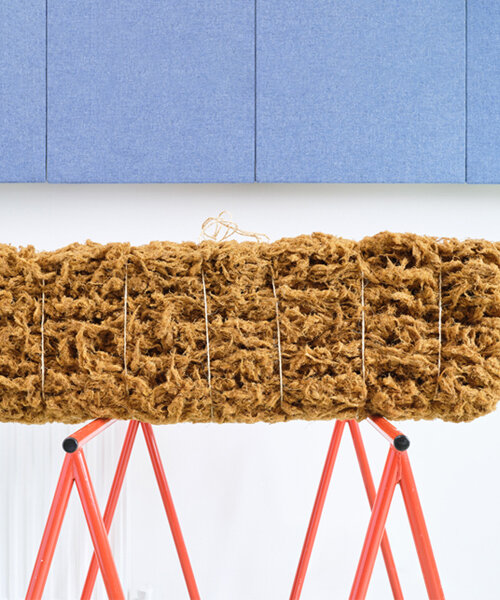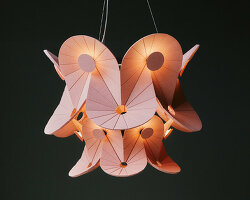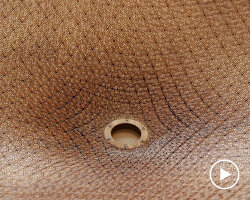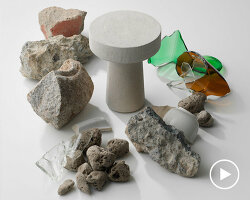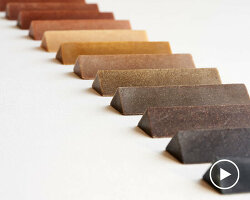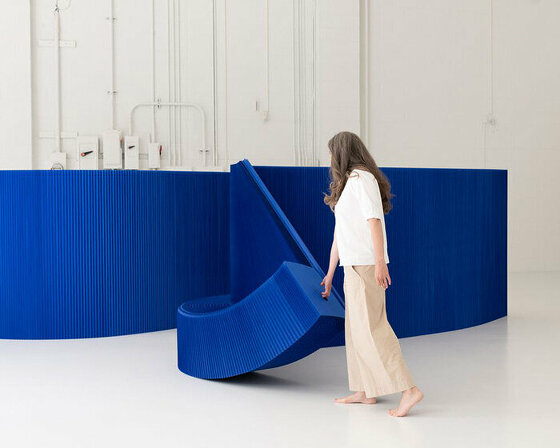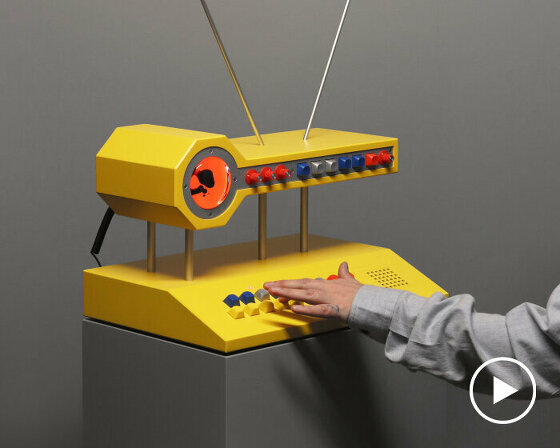ABC (Acoustic Byssus Core) tiles by seastex
Seastex, founded in June 2021 by Belgian designer Sander Nevejans, developed a groundbreaking method to convert mussel beard (byssus) waste into high-quality acoustic materials and products, dubbed ABC (Acoustic Byssus Core) tiles. Byssus filaments are natural fibers created by certain kinds of marine and freshwater bivalve mollusks, which use the byssus to anchor themselves to rocks, substrates, or seabed. In edible mussels, the byssus, also known as the ‘beard’, is a part of the inedible mussel that is typically removed before cooking or packaging. Through innovative solutions and sustainable practices, Seastex is committed to mitigating the environmental impact of the mussel industry and actively contributing to reducing greenhouse gas emissions in the architecture and interior design sectors.

2023 – ABC (Acoustic Byssus Core) tiles within an interior | image © Yeshen Venema
leveraging the unique properties of mussel beards (byssus)
When Seastex (see more here) received the initial waste sample in April 2021, it was unclear what byssus could become. In year one of its research efforts, the company embarked on a meticulous testing process for hundreds of samples collected from an original specimen to uncover the actual properties of byssus. Careful analysis and examination allowed Seastex to reveal the unique characteristics of this natural material. Building upon this knowledge, it focused in year two on finding an eco-friendly solution to address the issue of processing highly polluted mussel waste. After countless experiments, founder Sander Nevejans developed an all-natural treatment process that effectively cleanses large quantities of this waste and transforms the byssus fibers into a uniform and homogeneous material. By developing novel fiber processing technology, Seastex has further revolutionized this byssus material, turning it into a cloud-like substance called ‘Seawool’ or ‘Sea bale’.

2023 – a bale of raw mussel beard (byssus) material or ‘sea bale’ | image © Yeshen Venema
achieving sustainable goals in production & economic growth
Why byssus? Nevejans explains: ‘Byssus fibers possess great potential as high-value and long-lasting materials in the international construction market. Not only do they offer unique acoustic properties for the production of novel sound-absorbing products, but they also contribute towards achieving multiple sustainable development goals. By harnessing the unique properties of byssus fibers, the construction sector can contribute to developing sustainable cities by utilizing eco-friendly materials.‘ Moreover, its cultivation can foster decent work opportunities and economic growth in coastal communities, thus promoting social equity. By embracing responsible consumption and production practices, the use of byssus fibers reduces the environmental footprint of the construction industry. Lastly, by sourcing the fibers sustainably from oceans, Seastex ensures the preservation and sustainable use of marine resources, thereby safeguarding the health of marine ecosystems.
Beyond their ecological value, these fibers are a competitive material due to their exceptional physical attributes. First and foremost, their low density makes them lightweight. They also have remarkable stability, ensuring that the end products maintain structural integrity over time. Ultimately, their high quality provides superior performance in various applications. Their easy processing through newly developed technologies allows for efficient and cost-effective manufacturing processes, saving time and resources.

2023 – founder Sander Nevejans holding a ‘sea bale’ | image © Yeshen Venema
fire-resistant, moldable, recycable & biodegradable
In year one, however, a groundbreaking discovery was made when Seastex realized that byssus has the remarkable ability to adapt to any shape it is compressed into. Building on this discovery, in year two, the company explored the acoustic properties accompanying the byssus. This led Seastex on a technological journey towards creating a new mold that efficiently shapes the byssus, allowing Seastex to produce durable and high-quality byssus cores that can both capture and muffle sound. The results proved exceptionally promising after conducting comprehensive tests on the compressed material. In-house research has revealed more promising results, this time regarding the extensive applicability of byssus when utilized as a non-woven fiber. As part of its commitment to sustainability, Seastex has developed a recycling process to unlock the full potential of the fibers. During this stage, byssus cores retained from old products are processed to seamlessly integrate into new ones, extending the active life of byssus indefinitely and encouraging a more circular and eco-friendly economy.
The material also offers an advantage regarding fire safety. Byssus demands a higher oxygen level for ignition, hence it seldom supports flames. Even in scenarios where smoldering might occur, it tends to cease rapidly. Moreover, when exposed to extreme heat, the cell membrane structure swells, creating an insulating layer that hinders the spread of fire. Seastex in-house research further reveals that byssus surpasses other natural and petroleum-based fibers in terms of fire safety standards. ‘This superiority can be attributed to its inherently lower flammability and its affinity for charring on the surface. The resulting charred layer provides an additional protective barrier, safeguarding the fiber core and underlying structures from the potential fire hazards. Notably, byssus cannot be ignited, does not melt like polyester and nylon, and does not add here to the skin even when warm. Additionally, it produces minimal smoke and toxic fumes, making it an exceedingly safe choice for architecture and interior applications,’ explains the company.
Compared with traditionally produced textiles such as sheep wool, cotton, hemp, or silk, mussel beards offer a sustainable and environmentally-friendly alternative because mussels do not require feeding, antibiotics, or pesticides, reducing the negative impact on ecosystems. Moreover, mussels can remarkably take up carbon dioxide (CO2) when growing, contributing to mitigating climate change. Additionally, mussels play a crucial role in water filtration by filtering microplastics, algae, bacteria, and other small particles, thereby improving water quality.

2023 – tiles close up | image © Yeshen Venema
Seastex tiles balance sound control with a calming design
Combining these impressive properties, the designer launched the Seastex ABC (Acoustic Byssus Core) tiles to override a current ‘glitch’ in modern architecture. With an emphasis on sleek and minimalist designs, today’s spaces often feature materials that can unintentionally result in uncomfortable noise levels. Seastex tackles this challenge head-on by collaborating with architects and designers to create spaces that provide exceptional sound control by enhancing quality and reducing unwanted echoes and reverberations.
Seastex ABC tiles can be mounted on walls and ceilings across various sectors. This acoustic solution is designed to enhance both aural comfort and aesthetic quality. With an extensive range of formats and vibrant colors to choose from, they offer an adaptive solution to the diverse acoustic challenges faced in various spaces. ‘Whether it’s a bustling open office, a serene healthcare facility, or a dynamic entertainment venue, Seastex balances functionality, and visual appeal, ensuring a harmonious and comfortable auditory experience for all,’ continues the founder.

2023 – ‘sea bale’ | image © Yeshen Venema
combining modern techniques and traditional craftsmanship
Seastex has over 15 years of experience in the metal construction and fabrication industry and is well-equipped to provide top-of-the-line installation systems for walls and ceilings. The ABC Tiles are designed to be detachable, providing a convenient and efficient method of gaining easy access to building services. This feature ensures that maintenance and repairs can be carried out with minimal disruption and inconvenience. Whether it’s electrical systems, plumbing, or HVAC components, the detachable tiles allow technicians to quickly and easily reach the necessary areas, reducing downtime and enhancing overall efficiency.
With this flexibility, building owners and facility managers can efficiently address any service-related issues, contributing to the smooth functioning and longevity of the building. Leveraging their expertise, Seastex utilizes 3D CAD software, laser cutting, bending technologies, and the touch of skilled manual labor to fabricate high-performance ABC tiles. This combination of modern techniques and traditional craftsmanship ensures that every frame Seastex produces is meticulously crafted to deliver performance and durability.
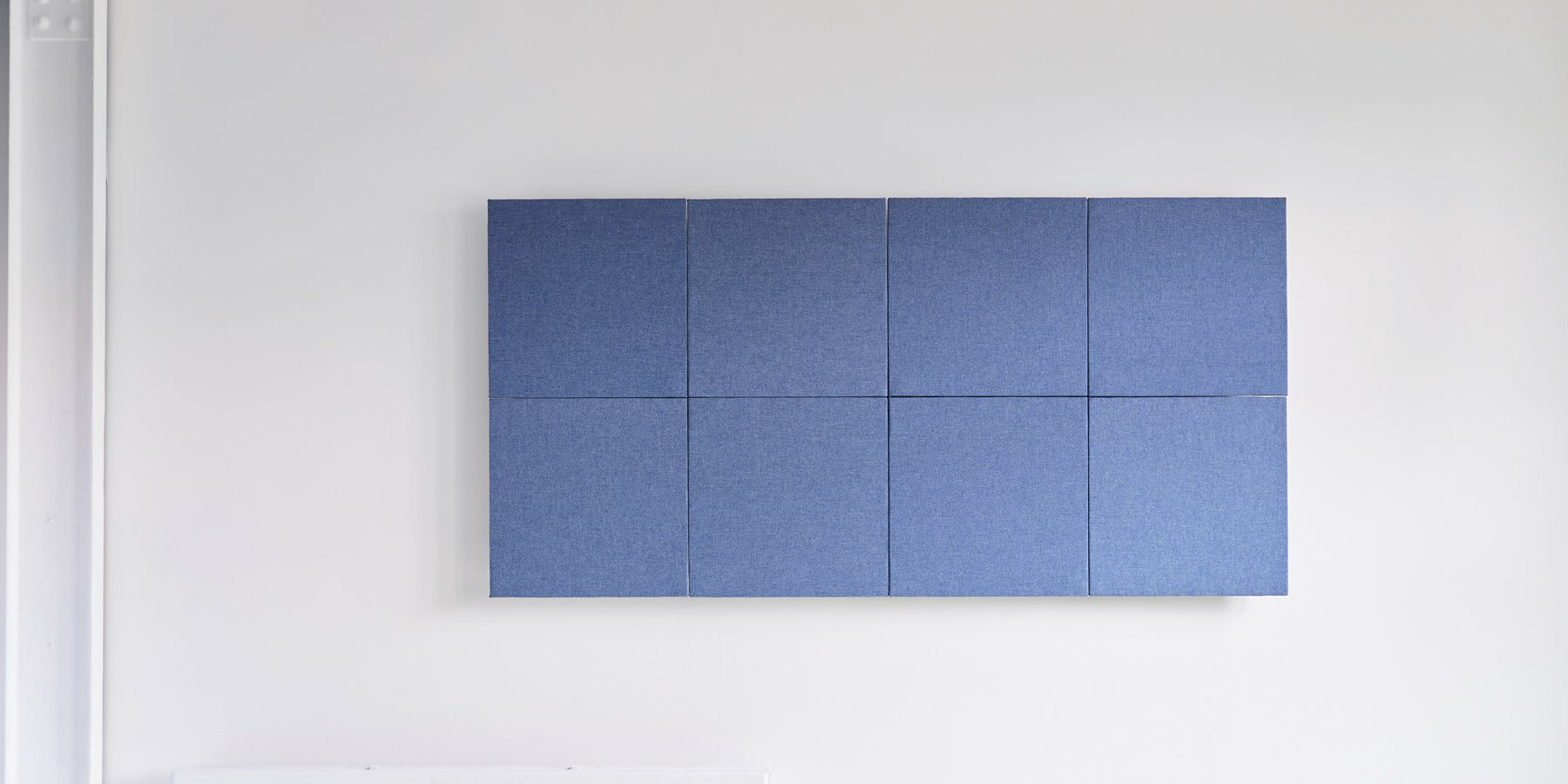
image © Yeshen Venema

2021 – R&D sample of raw cleaned mussel beards | image courtesy Sander Nevejans

2021 – vials with mussel beards at different stages of production process | image courtesy Sander Nevejans

2022 – R&D test sample of compressed mussel beards | image © Beyond Print
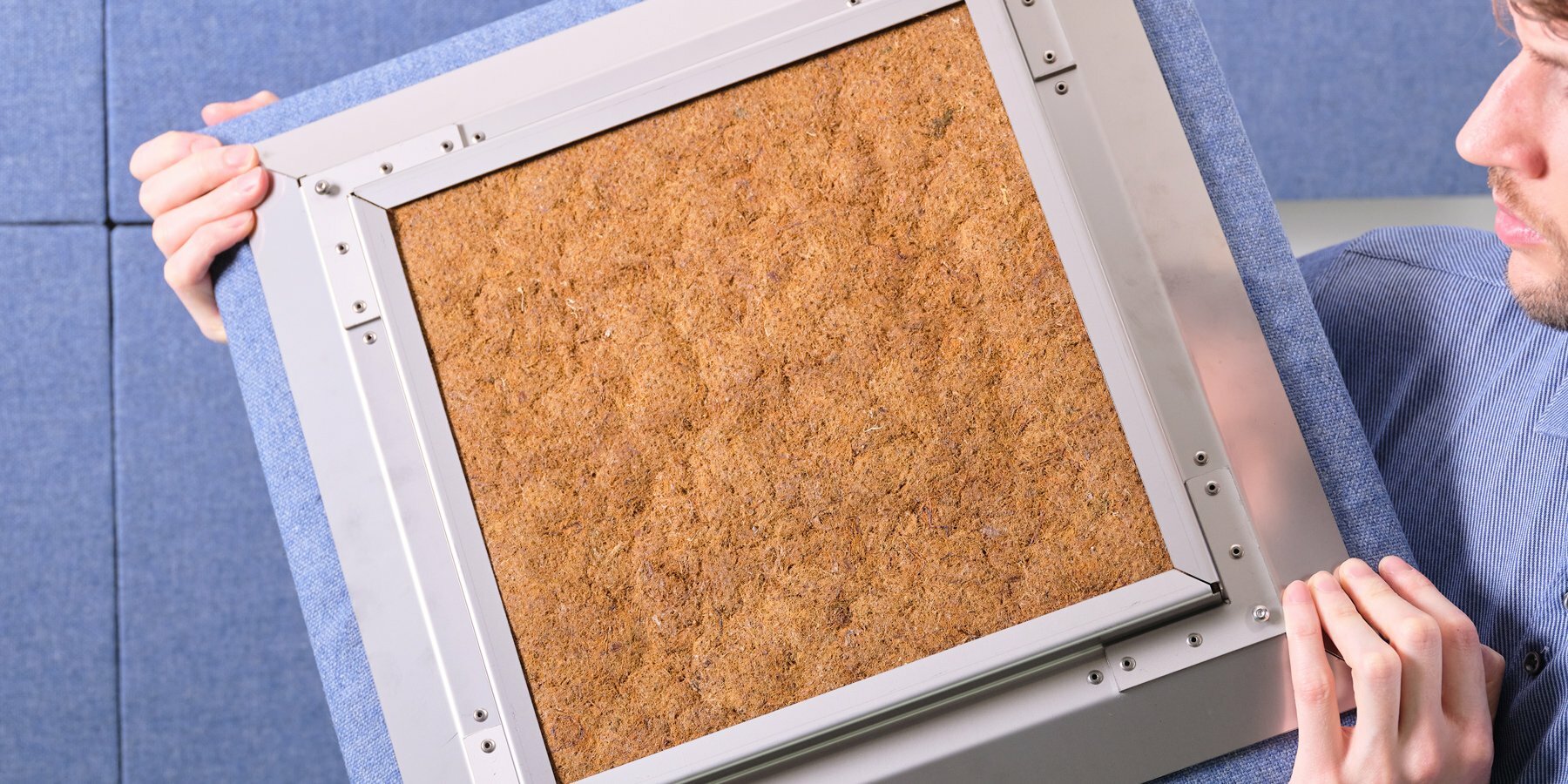
image © Yeshen Venema
project info:
name: Seastex ABC (Acoustic Byssus Core) tiles | @seastex.official
designer & founder: Sander Nevejans
photographers: Yeshen Venema | @yeshen.uk, Beyond Print
designboom has received this project from our DIY submissions feature, where we welcome our readers to submit their own work for publication. see more project submissions from our readers here.
edited by: lea zeitoun | designboom
acoustic panels (8)
materials (81)
PRODUCT LIBRARY
a diverse digital database that acts as a valuable guide in gaining insight and information about a product directly from the manufacturer, and serves as a rich reference point in developing a project or scheme.
